formerly eScholarship Editions


|
|
|
|
Your request for similar items found 20 book(s). | Modify Search | Displaying 1 - 20 of 20 book(s) | |
| 1. | 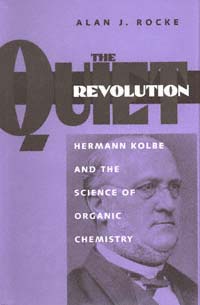 | Title: The quiet revolution: Hermann Kolbe and the science of organic chemistry Author: Rocke, Alan J 1948- Published: University of California Press, 1993 Subjects: Science | History and Philosophy of Science | Physical Sciences | European History Publisher's Description: Organic chemist Hermann Kolbe (1818-1884) is the subject of this vigorously contextualized biography, which combines the approaches of cognitive and social history of science. Kolbe was one of the most outstanding chemists during the remarkable period in which German science, like the wider manifestations of German industrial and political power, rose to a position of world dominance.Rocke portrays Kolbe as a leading actor in the transformation of the institutional and pedagological dimensions of the physical sciences, as well as in the rapid growth of technologically powerful pure sciences. In all these areas there was a sharp inflection point around 1860 when, as Rocke persuasively argues, the primary discipline in the drama was organic chemistry. [brief] Similar Items |
| 2. | 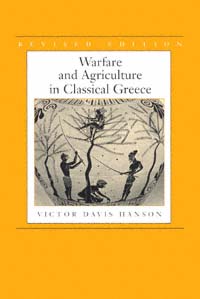 | Title: Warfare and agriculture in classical Greece Author: Hanson, Victor Davis Published: University of California Press, 1998 Subjects: Classics | Classical History | Military History | Ancient History | Classical Politics | Agriculture Publisher's Description: The ancient Greeks were for the most part a rural, not an urban, society. And for much of the Classical period, war was more common than peace. Almost all accounts of ancient history assume that farming and fighting were critical events in the lives of the citizenry. Yet never before have we had a comprehensive modern study of the relationship between agriculture and warfare in the Greek world. In this completely revised edition of Warfare and Agriculture in Classical Greece , Victor Davis Hanson provides a systematic review of Greek agriculture and warfare and describes the relationship between these two important aspects of life in ancient communities. With careful attention to agronomic as well as military details, this well-written, thoroughly researched study reveals the remarkable resilience of those farmland communities.In the past, scholars have assumed that the agricultural infrastructure of ancient society was often ruined by attack, as, for example, Athens was relegated to poverty in the aftermath of the Persian and later Peloponnesian invasions. Hanson's study shows, however, that in reality attacks on agriculture rarely resulted in famines or permanent agrarian depression. Trees and vines are hard to destroy, and grainfields are only briefly vulnerable to torching. In addition, ancient armies were rather inefficient systematic ravagers and instead used other tactics, such as occupying their enemies' farms to incite infantry battle. Warfare and Agriculture in Classical Greece suggests that for all ancient societies, rural depression and desolation came about from more subtle phenomena - taxes, changes in political and social structure, and new cultural values - rather than from destructive warfare. [brief] Similar Items |
| 3. | 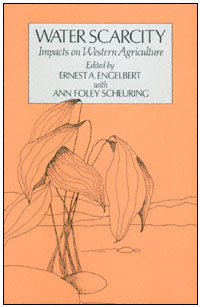 | Title: Water scarcity: impacts on western agriculture Author: Engelbert, Ernest A Published: University of California Press, 1984 Subjects: Environmental Studies | Water | Agriculture Similar Items |
| 4. | 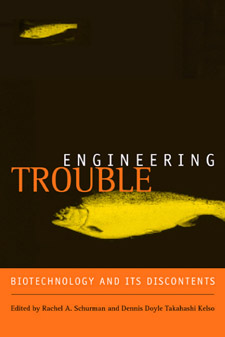 | Title: Engineering trouble: biotechnology and its discontents Author: Schurman, Rachel Published: University of California Press, 2003 Subjects: Sociology | Conservation | EcologyEvolutionEnvironment | Technology and Society | Agriculture | Technology | Public Policy Publisher's Description: Talk of genetically engineered organisms (GEOs) has moved from the hushed corridors of life science corporations to the front pages of the world's major newspapers. As Europeans began rejecting genetically engineered foods in the marketplace, the StarLink corn incident exploded in the United States and farmers set fire to genetically modified crops in India. Citizens and consumers have become increasingly aware of and troubled by the issues surrounding these new technologies. Considering cases from agriculture, food, forestry, and pharmaceuticals, this book examines some of the most pressing questions raised by genetic engineering. What determines whether GEOs enter the food supply, and how are such decisions being made? How is the biotechnology industry using its power to reshape food, fiber, and pharmaceutical production, and how are citizen-activists challenging these initiatives? And what are the social and political consequences of global differences over GEOs? [brief] Similar Items |
| 5. | 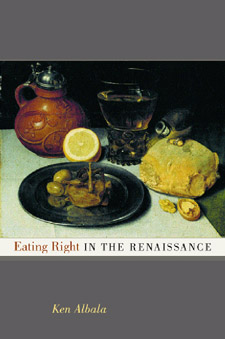 | Title: Eating right in the Renaissance Author: Albala, Ken 1964- Published: University of California Press, 2002 Subjects: Food and Cooking | Renaissance History | History of Science | History of Food Publisher's Description: Eating right has been an obsession for longer than we think. Renaissance Europe had its own flourishing tradition of dietary advice. Then, as now, an industry of experts churned out diet books for an eager and concerned public. Providing a cornucopia of information on food and an intriguing account of the differences between the nutritional logic of the past and our own time, this inviting book examines the wide-ranging dietary literature of the Renaissance. Ken Albala ultimately reveals the working of the Renaissance mind from a unique perspective: we come to understand a people through their ideas on food. Eating Right in the Renaissance takes us through an array of historical sources in a narrative that is witty and spiced with fascinating details. Why did early Renaissance writers recommend the herbs parsley, arugula, anise, and mint to fortify sexual prowess? Why was there such a strong outcry against melons and cucumbers, even though people continued to eat them in large quantities? Why was wine considered a necessary nutrient? As he explores these and other questions, Albala explains the history behind Renaissance dietary theories; the connections among food, exercise, and sex; the changing relationship between medicine and cuisine; and much more. Whereas modern nutritionists may promise a slimmer waistline, more stamina, or freedom from disease, Renaissance food writers had entirely different ideas about the value of eating right. As he uncovers these ideas from the past, Ken Albala puts our own dietary obsessions in an entirely new light in this elegantly written and often surprising new chapter on the history of food. [brief] Similar Items |
| 6. | 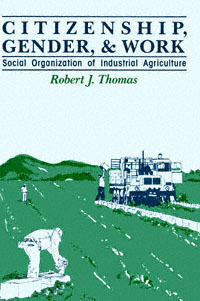 | Title: Citizenship, gender, and work: the social organization of industrial agriculture Author: Thomas, Robert J Published: University of California Press, 1992 Subjects: Sociology | Labor Studies | Anthropology | Gender Studies | Agriculture Publisher's Description: Why do farm workers earn less and have a lower status than blue-collar employees in comparable jobs? Robert J. Thomas answers this question through a multi-method study of agricultural work and labor markets. Fieldwork as a lettuce harvester provides valuable insights from the perspective of undocum . . . [more] Similar Items |
| 7. | 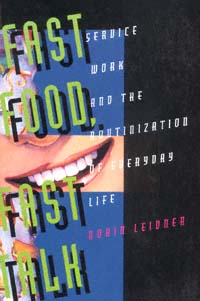 | Title: Fast food, fast talk: service work and the routinization of everyday life Author: Leidner, Robin Published: University of California Press, 1993 Subjects: Sociology | Technology and Society | Economics and Business | Gender Studies | Popular Culture | Food and Cooking Publisher's Description: Attending Hamburger University, Robin Leidner observes how McDonald's trains the managers of its fast-food restaurants to standardize every aspect of service and product. Learning how to sell life insurance at a large midwestern firm, she is coached on exactly what to say, how to stand, when to make eye contact, and how to build up Positive Mental Attitude by chanting "I feel happy! I feel terrific!"Leidner's fascinating report from the frontlines of two major American corporations uncovers the methods and consequences of regulating workers' language, looks, attitudes, ideas, and demeanor. Her study reveals the complex and often unexpected results that come with the routinization of service work.Some McDonald's workers resent the constraints of prescribed uniforms and rigid scripts, while others appreciate how routines simplify their jobs and give them psychological protection against unpleasant customers. Combined Insurance goes further than McDonald's in attempting to standardize the workers' very selves, instilling in them adroit maneuvers to overcome customer resistance.The routinization of service work has both poignant and preposterous consequences. It tends to undermine shared understandings about individuality and social obligations, sharpening the tension between the belief in personal autonomy and the domination of a powerful corporate culture.Richly anecdotal and accessibly written, Leidner's book charts new territory in the sociology of work. With service sector work becoming increasingly important in American business, her timely study is particularly welcome. [brief] Similar Items |
| 8. | 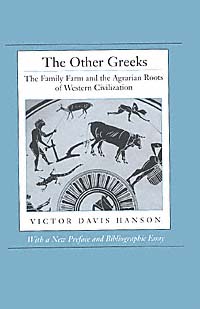 | Title: The other Greeks: the family farm and the agrarian roots of western civilization Author: Hanson, Victor Davis Published: University of California Press, 1999 Subjects: Classics | European History Publisher's Description: For generations, scholars have focused on the rise of the Greek city-state and its brilliant cosmopolitan culture as the ultimate source of the Western tradition in literature, philosophy, and politics. This passionate book leads us outside the city walls to the countryside, where the vast majority of the Greek citizenry lived, to find the true source of the cultural wealth of Greek civilization. Victor Hanson shows that the real "Greek revolution" was not merely the rise of a free and democratic urban culture, but rather the historic innovation of the independent family farm.The farmers, vinegrowers, and herdsmen of ancient Greece are "the other Greeks," who formed the backbone of Hellenic civilization. It was these tough-minded, practical, and fiercely independent agrarians, Hanson contends, who gave Greek culture its distinctive emphasis on private property, constitutional government, contractual agreements, infantry warfare, and individual rights. Hanson's reconstruction of ancient Greek farm life, informed by hands-on knowledge of the subject (he is a fifth-generation California vine- and fruit-grower) is fresh, comprehensive, and absorbing. His detailed chronicle of the rise and tragic fall of the Greek city-state also helps us to grasp the implications of what may be the single most significant trend in American life today - the imminent extinction of the family farm. [brief] Similar Items |
| 9. | 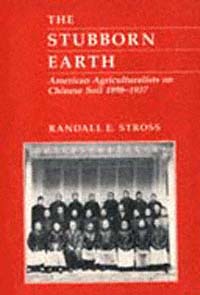 | Title: The stubborn earth: American agriculturalists on Chinese soil, 1898-1937 Author: Stross, Randall E Published: University of California Press, 1989 Subjects: Asian Studies | China Publisher's Description: This is a study of the first major American effort to aid a developing country - China - in the early twentieth century. Anyone interested in U.S.-China relations and in the American presence abroad will find it provocative and frequently moving. Similar Items |
| 10. | 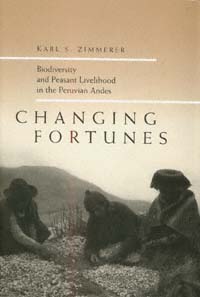 | Title: Changing fortunes: biodiversity and peasant livelihood in the Peruvian Andes Author: Zimmerer, Karl S Published: University of California Press, 1997 Subjects: Anthropology | Geography | Ecology | Latin American Studies Publisher's Description: Two of the world's most pressing needs - biodiversity conservation and agricultural development in the Third World - are addressed in Karl S. Zimmerer's multidisciplinary investigation in geography. Zimmerer challenges current opinion by showing that the world-renowned diversity of crops grown in the Andes may not be as hopelessly endangered as is widely believed. He uses the lengthy history of small-scale farming by Indians in Peru, including contemporary practices and attitudes, to shed light on prospects for the future. During prolonged fieldwork among Peru's Quechua peasants and villagers in the mountains near Cuzco, Zimmerer found convincing evidence that much of the region's biodiversity is being skillfully conserved on a de facto basis, as has been true during centuries of tumultuous agrarian transitions.Diversity occurs unevenly, however, because of the inability of poorer Quechua farmers to plant the same variety as their well-off neighbors and because land use pressures differ in different locations. Social, political, and economic upheavals have accentuated the unevenness, and Zimmerer's geographical findings are all the more important as a result. Diversity is indeed at serious risk, but not necessarily for the same reasons that have been cited by others. The originality of this study is in its correlation of ecological conservation, ethnic expression, and economic development. [brief] Similar Items |
| 11. | 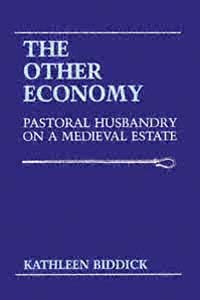 | Title: The other economy: pastoral husbandry on a medieval estate Author: Biddick, Kathleen Published: University of California Press, 1989 Subjects: History | European History | Medieval Studies Publisher's Description: While the cereal agriculture of medieval Europe has been studied exhaustively, the pastoral resources and livestock husbandry of medieval estates have been seriously neglected. Kathleen Biddick's examination of one estate, Peterborough Abbey, during several decades before and after 1100 and the first decade after 1300, brings a new balance to the subject of the medieval economy. Her pioneering methodology and the conclusions she reaches will interest archaeologists and agricultural historians as well as anthropologists, economists, and historians of early European development.Drawing on the archival records of the abbey, an estate that straddled the "classic" open-field agriculture of the English Midlands and the more pastorally-oriented farming of the English peat fens, Biddick describes in great detail how these farmers managed their herds and consumed and marketed livestock products such as meat, wool, hides, milk, and cheese. Commitment to conserving consumption strategies did not mean that the Abbey resisted market involvement and technological innovation. Large numbers of work and cart horses indicate the estate's economic interest in speedy haulage. Cereal yields, where they are calculable, compare favorably to the high-yielding demesnes of parts of Norfolk, the most agriculturally advanced region of medieval England. By showing how the Abbey coordinated its resources to enhance diversity and flexibility, The Other Economy enlarges our understanding of agrarian lordship and political control over resources in the medieval economy. [brief] Similar Items |
| 12. | 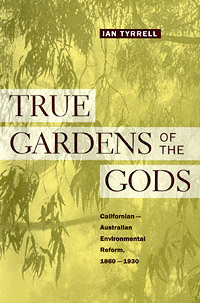 | Title: True gardens of the gods: Californian-Australian environmental reform, 1860-1930 Author: Tyrrell, Ian R Published: University of California Press, 1999 Subjects: History | California and the West | Environmental Studies Publisher's Description: One of the most critical environmental challenges facing both Californians and Australians in the 1860s involved the aftermath of the gold rushes. Settlers on both continents faced the disruptive impacts of mining, grazing, and agriculture; in response to these challenges, environmental reformers attempted to remake the natural environment into an idealized garden landscape. As this cutting-edge history shows, an important result of this nineteenth-century effort to "renovate" nature was a far-reaching exchange of ideas between the United States - especially in California - and Australia. Ian Tyrrell demonstrates how Californians and Australians shared plants, insects, personnel, technology, and dreams, creating a system of environmental exchange that transcended national and natural boundaries. True Gardens of the Gods traces a new nineteenth-century environmental sensibility that emerged from the collision of European expansion with these frontier environments.Tyrrell traces historical ideas and personalities, provides in-depth discussions of introduced plants species (such as the eucalyptus and Monterey Pine), looks at a number of scientific programs of the time, and measures the impact of race, class, and gender on environmental policy. The book represents a new trend toward studying American history from a transnational perspective, focusing especially on a comparison of American history with the history of similar settler societies. Through the use of original research and an innovative methodology, this book offers a new look at the history of environmentalism on a regional and global scale. [brief] Similar Items |
| 13. | 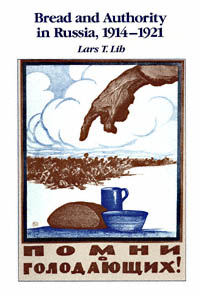 | Title: Bread and authority in Russia, 1914-1921 Author: Lih, Lars T Published: University of California Press, 1990 Subjects: History | European History | Politics | Russian and Eastern European Studies Publisher's Description: Between 1914 and 1921, Russia experienced a national crisis that destroyed the tsarist state and led to the establishment of the new Bolshevik order. During this period of war, revolution, and civil war, there was a food-supply crisis. Although Russia was one of the world's major grain exporters, the country was no longer capable of feeding its own people. The hunger of the urban workers increased the pace of revolutionary events in 1917 and 1918, and the food-supply policy during the civil war became the most detested symbol of the hardships imposed by the Bolsheviks.Focusing on this crisis, Lars Lih examines the fundamental process of political and social breakdown and reconstitution. He argues that this seven-year period is the key to understanding the Russian revolution and its aftermath. In 1921 the Bolsheviks rejected the food-supply policy established during the civil war; sixty-five years later, Mikhail Gorbachev made this change of policy a symbol of perestroika. Since then, more attention has been given both in the West and in the Soviet Union to the early years of the revolution as one source of the tragedies of Stalinist oppression.Lih's argument is based on a great variety of source material - archives, memoirs, novels, political rhetoric, pamphlets, and propoganda posters. His new study will be read with profit by all who are interested in the drama of the Russian revolution, the roots of both Stalinism and anti-Stalin reform, and more generally in a new way of understanding the effects of social and political breakdown. [brief] Similar Items |
| 14. | 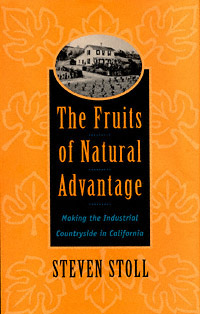 | Title: The fruits of natural advantage: making the industrial countryside in California Author: Stoll, Steven Published: University of California Press, 1998 Subjects: History | Californian and Western History | Environmental Studies | California and the West | Labor Studies Publisher's Description: The once arid valleys and isolated coastal plains of California are today the center of fruit production in the United States. Steven Stoll explains how a class of capitalist farmers made California the nation's leading producer of fruit and created the first industrial countryside in America. This brilliant portrayal of California from 1880 to 1930 traces the origins, evolution, and implications of the fruit industry while providing a window through which to view the entire history of California.Stoll shows how California growers assembled chemicals, corporations, and political influence to bring the most perishable products from the most distant state to the great urban markets of North America. But what began as a compromise between a beneficent environment and intensive cultivation ultimately became threatening to the soil and exploitative of the people who worked it.Invoking history, economics, sociology, agriculture, and environmental studies, Stoll traces the often tragic repercussions of fruit farming and shows how central this story is to the development of the industrial countryside in the twentieth century. [brief] Similar Items |
| 15. | 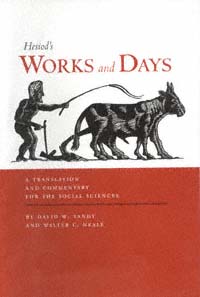 | Title: Hesiod's Works and days Author: Hesiod Published: University of California Press, 1997 Subjects: Economics and Business | Classics | Sociology | Ancient History Publisher's Description: This new, annotated translation of Hesiod's Works and Days is a collaboration between David W. Tandy, a classicist, and Walter Neale, an economist and economic historian. Hesiod was an ancient Greek poet whose Works and Days discusses agricultural practices and society in general. Classicists and ancient historians have turned to Works and Days for its insights on Greek mythology and religion. The poem also sheds light on economic history and ancient agriculture, and is a good resource for social scientists interested in these areas. This translation emphasizes the activities and problems of a practicing agriculturist as well as the larger, changing political and economic institutions of the early archaic period.The authors provide a clear, accurate translation along with notes aimed at a broad audience. The introductory essay discusses the changing economic, political and trading world of the eighth and seventh centuries B.C.E., while the notes present the range and possible meanings of important Greek terms and references in the poem and highlight areas of ambiguity in our understanding of Works and Days . [brief] Similar Items |
| 16. | 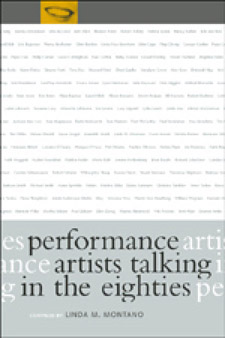 | Title: Performance artists talking in the eighties: sex, food, money/fame, ritual/death Author: Montano, Linda 1942- Published: University of California Press, 2001 Subjects: Art | Art History | Cinema and Performance Arts Publisher's Description: Performance artist Linda Montano, curious about the influence childhood experience has on adult work, invited other performance artists to consider how early events associated with sex, food, money/fame, or death/ritual resurfaced in their later work. The result is an original and compelling talking performance that documents the production of art in an important and often misunderstood community. Among the more than 100 artists Montano interviewed from 1979 to 1989 were John Cage, Suzanne Lacy, Faith Ringgold, Dick Higgins, Annie Sprinkle, Allan Kaprow, Meredith Monk, Eric Bogosian, Adrian Piper, Karen Finley, and Kim Jones. Her discussions with them focused on the relationship between art and life, history and memory, the individual and society, and the potential for individual and social change. The interviews highlight complex issues in performance art, including the role of identity in performer-audience relationships and art as an exploration of everyday conventions rather than a demonstration of virtuosity. [brief] Similar Items |
| 17. | 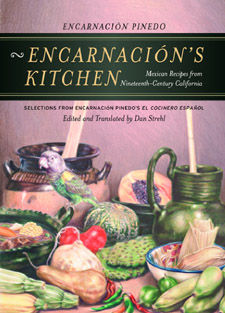 | Title: Encarnación's kitchen: Mexican recipes from nineteenth-century California: selections from Encarnación Pinedo's El cocinero español Author: Pinedo, Encarnación b. 1848 Published: University of California Press, 2003 Subjects: Food and Cooking | California and the West | Californian and Western History | Ethnic Studies | Women's Studies Publisher's Description: In 1991 Ruth Reichl, then a Los Angeles Times food writer, observed that much of the style now identified with California cuisine, and with nouvelle cuisine du Mexique, was practiced by Encarnación Pinedo a century earlier. A landmark of American cuisine first published in 1898 as El cocinero español (The Spanish Cook), Encarnación's Kitchen is the first cookbook written by a Hispanic in the United States, as well as the first recording of Californio food - Mexican cuisine prepared by the Spanish-speaking peoples born in California. Pinedo's cookbook offers a fascinating look into the kitchens of a long-ago culture that continues to exert its influence today. Of some three hundred of Pinedo's recipes included here - a mixture of Basque, Spanish, and Mexican - many are variations on traditional dishes, such as chilaquiles, chiles rellenos, and salsa (for which the cook provides fifteen versions). Whether describing how to prepare cod or ham and eggs (a typical Anglo dish labeled "huevos hipócritas" ), Pinedo was imparting invaluable lessons in culinary history and Latino culture along with her piquant directions. In addition to his lively, clear translation, Dan Strehl offers a remarkable view of Pinedo's family history and of the material and literary culture of early California cooking. Prize-winning journalist Victor Valle puts Pinedo's work into the context of Hispanic women's testimonios of the nineteenth century, explaining how the book is a deliberate act of cultural transmission from a traditionally voiceless group. [brief] Similar Items |
| 18. | 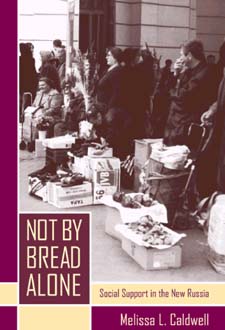 | Title: Not by bread alone: social support in the new Russia Author: Caldwell, Melissa L 1969- Published: University of California Press, 2004 Subjects: Anthropology | Russian and Eastern European Studies | European Studies Publisher's Description: What Muscovites get in a soup kitchen run by the Christian Church of Moscow is something far more subtle and complex - if no less necessary and nourishing - than the food that feeds their hunger. In Not by Bread Alone, the first full-length ethnographic study of poverty and social welfare in the postsocialist world, Melissa L. Caldwell focuses on the everyday operations and civil transactions at CCM soup kitchens to reveal the new realities, the enduring features, and the intriguing subtext of social support in Russia today. In an international food aid community, Caldwell explores how Muscovites employ a number of improvisational tactics to satisfy their material needs. She shows how the relationships that develop among members of this community - elderly Muscovite recipients, Russian aid workers, African student volunteers, and North American and European donors and volunteers - provide forms of social support that are highly valued and ultimately far more important than material resources. In Not by Bread Alone we see how the soup kitchens become sites of social stability and refuge for all who interact there - not just those with limited financial means - and how Muscovites articulate definitions of hunger and poverty that depend far more on the extent of one's social contacts than on material factors. By rethinking the ways in which relationships between social and economic practices are theorized - by identifying social relations and social status as Russia's true economic currency - this book challenges prevailing ideas about the role of the state, the nature of poverty and welfare, the feasibility of Western-style reforms, and the primacy of social connections in the daily lives of ordinary people in post-Soviet Russia. [brief] Similar Items |
| 19. | 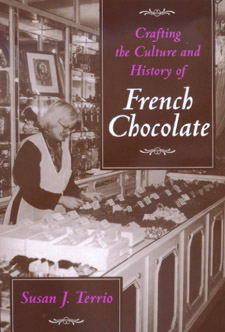 | Title: Crafting the culture and history of French chocolate Author: Terrio, Susan J. (Susan Jane) 1950- Published: University of California Press, 2000 Subjects: Anthropology | European Studies | French Studies | Food and Cooking | Sociology Publisher's Description: This absorbing narrative follows the craft community of French chocolatiers - members of a tiny group experiencing intensive international competition - as they struggle to ensure the survival of their businesses. Susan J. Terrio moves easily among ethnography, history, theory, and vignette, telling a story that challenges conventional views of craft work, associational forms, and training models in late capitalism. She enters the world of Parisian craft leaders and local artisanal families there and in southwest France to relate how they work and how they confront the representatives and structures of power, from taste makers, CEOs, and advertising executives to the technocrats of Paris and Brussels. Looking at craft culture and community from a cross-disciplinary perspective, Terrio finds that the chocolatiers affirm their collective identity and their place in the present by commemorating selectively their role in history. In addition to joining a distinguished tradition of American anthropological writing on the role of food, her study of the social production of taste in the invention of vintage, grand cru chocolates lends specificity and weight to theories of consumption by Pierre Bourdieu and others. The book will appeal to anthropologists, cultural studies scholars, and anyone curious about life in contemporary France. [brief] Similar Items |
| 20. | 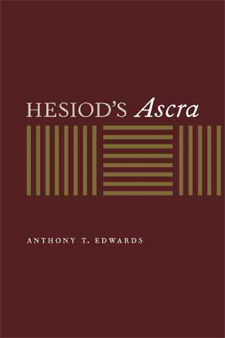 | Title: Hesiod's Ascra Author: Edwards, Anthony T Published: University of California Press, 2004 Subjects: Classics | Classical History | Classical Politics | Classical Literature and Language | Economics and Business Publisher's Description: In Works and Days, one of the two long poems that have come down to us from Hesiod, the poet writes of farming, morality, and what seems to be a very nasty quarrel with his brother Perses over their inheritance. In this book, Anthony T. Edwards extracts from the poem a picture of the social structure of Ascra, the hamlet in northern Greece where Hesiod lived, most likely during the seventh century b.c.e. Drawing on the evidence of trade, food storage, reciprocity, and the agricultural regime as Hesiod describes them in Works and Days, Edwards reveals Ascra as an autonomous village, outside the control of a polis, less stratified and integrated internally than what we observe even in Homer. In light of this reading, theconflict between Hesiod and Perses emerges as a dispute about the inviolability of the community's external boundary and the degree of interobligation among those within the village. Hesiod's Ascra directly counters the accepted view of Works and Days, which has Hesiod describing a peasant society subordinated to the economic and political control of an outside elite. Through his deft analysis, Edwards suggests a new understanding of both Works and Days and the social and economic organization of Hesiod's time and place. [brief] Similar Items |